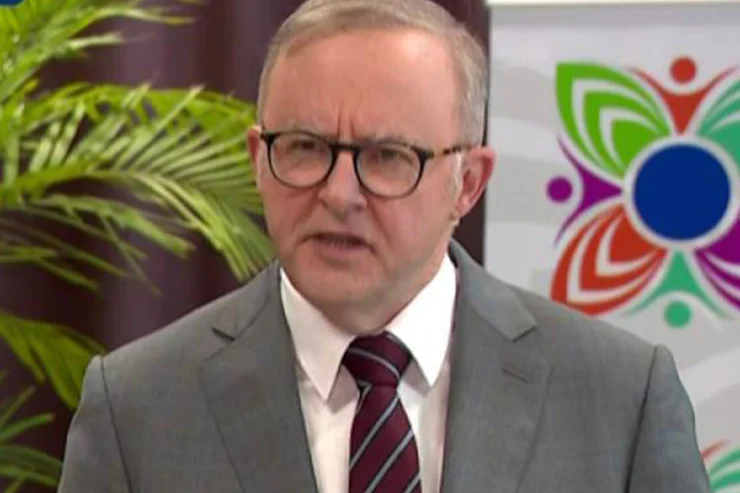Australian Prime Minister Anthony Albanese has vowed to take a leadership role on climate change at a Commonwealth summit that is splitting over who should pay to cut emissions, as Pacific leaders blame Australia for exporting coal and gas.
Albanese said he wanted action on climate at the Commonwealth gathering in Samoa, saying it was an existential threat to Pacific nations.
The prime minister arrived in the Samoan capital of Apia on Thursday afternoon for two days of talks, hours after leaders from Tuvalu and Vanuatu named Australia as a cause of the climate challenge.
Tuvalu Prime Minister Feleti Teo said Australia was morally obliged to take stronger action on climate because the country’s fossil fuel exports were not in the spirit of reducing emissions to net zero levels by 2050.
Albanese said he stood for action on climate at the Commonwealth Heads of Government Meeting.
“Here in the Pacific, climate change is, of course, an existential threat to countries like Tuvalu and Kiribati and others in our region where we are,” he said. “So, whenever we’re engaged in the Pacific, that is front and centre.
“The entry fee for credibility, when it comes to international forums such as this, is acknowledgement of the challenge of climate change and of preparedness to act on it.
“And it is up to countries like Australia to show leadership. We have done that, which is one of the ways that we have restored our credibility in international forums such as this.”
The Tuvalu prime minister spoke to journalists after launching a report by the Fossil Fuel Non-Proliferation Treaty Initiative that blames Australia, Canada and the United Kingdom for producing 60 per cent of carbon emissions from all Commonwealth nations, even though they account for only 6 per cent of the population.
The initiative, led by Samoan activist Brianna Fruean, describes itself as an idea rather than an organisation. Its report was backed by Ralph Regenvanu, the Special Envoy for Climate Change and Environment for Vanuatu.
In a key difference from other studies, the report calculates the 60 percent figure by counting all fossil fuel extraction, including the coal and gas Australia exports. This contrasts with the approach under the United Nations protocol on climate change, which counts emissions where the energy is consumed.
Teo said Australia had signed a climate commitment with Tuvalu and should cut emissions further to honour the agreement.
“My view of that commitment is that Australia has not only given a legal commitment but is highly morally obliged to ensure that whatever action it does will not compromise the commitment that it has provided in terms of climate impact on Tuvalu,” he said.
“On that platform, I am hoping that we will be able to leverage Australia’s support and hopefully that will translate to reducing its emission levels.
“As you know, the current Australian government commits to net zero by 2050.
“Obviously, the activities and actions that are reported in the report that is being launched are not consistent with the broader spirit of achieving that objective.”
The host of the meeting, Samoan Prime Minister Fiamē Naomi Mataʻafa, is seeking a stronger commitment on climate change as a step towards a global pact at the UN climate summit later this year.
King Charles III, who is presiding over this year’s meeting for the first time as sovereign and head of the Commonwealth, has signalled his support for that objective by making the environment a major part of his visit.
Albanese will hold talks with British Prime Minister Sir Keir Starmer on Friday morning before the CHOGM formalities, their first face-to-face meeting since the UK election in July.
While some Commonwealth leaders want the UK to apologise for historical slavery, Starmer has rejected that call and said he wanted this week’s meeting to put a priority on climate change.
Albanese said the decision on slavery was a matter for the UK and he expected to focus on climate change, economic development and the “blue Pacific” agenda on ocean health.
On the eve of CHOGM, the head of the Commonwealth’s business forum, Lord Jonathan Marland, declared Australia had a chance to regain support in the Pacific after being “asleep on the watch” while China extended its reach.
“What has struck me about being here is how Australia – and, indeed, New Zealand – are now committing to really supporting these islands in a much more positive way than they have in the past,” Marland said.
Australian Foreign Minister Penny Wong acknowledged the concerns of Pacific Islands nations, saying the world needed to work together to reduce coal and gas with India and China combining for 40 percent of global emissions.
Australia was undertaking a large-scale transition to renewable energy but had lagged due to stalled investment from previous coalition governments, she said.
“We all understand the existential threat that climate change poses to the peoples of the Pacific,” she told reporters in the Samoan capital Apia on Thursday.
“In order for us to have a chance at restraining both global temperature rise, we all have to commit to reducing emissions and to transitioning to cleaner energy.”
The foreign minister announced a partnership for climate-responsive agriculture to be developed by the Australian Centre for International Agricultural Research to address food security in Africa.
“It leverages a particular Australian expertise into a continent for which food insecurity is an ongoing and rising challenge,” she said.
“One of the things Australia is good at is agriculture in very dry climates,” she said.














